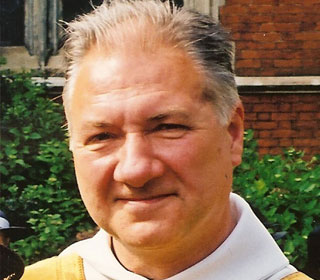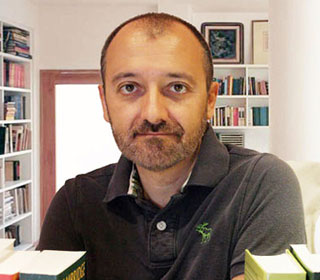Associate Team
Rev. Paul S. Fiddes

Rev. Paul S. Fiddes holds the Title of Distinction of Professor of Systematic Theology at the University of Oxford. He is Fellow of the British Academy, director of the project for the Study of Love in Religion (www.loveinreligion.org); founder (and continuing participant) in the Oxford Centre for Religion and Culture and the Centre for Baptist Studies, both in Regent’s Park College, Oxford; advisory panel for Ecclesiology and Ethnography network; and advisory panel for The Power of the Word project. He is one of the leading contemporary scholars of the intersection between theology and literature. His published work on Shakespeare and religion includes Shakespeare and Religion (Ilia UP, 2014) and More Things in Heaven and Earth: Shakespeare, Theology and the Interplay of Texts (U of Virginia, 2021). Among several essays exploring the afterlife of Shakespeare in Christian theology is “‘I would as lief be a Brownist…’Puritanism and Spirituality in Shakespeare’sTwelfth Night” in Christian Shakespeare: Question Mark. A Collection of Essays on Shakespeare in his Christian Context (Wilmington, Delamare: Vernon Press, 2022), “Shakespeare and Spirituality” in Re-Membering the Body. The Witness of History, Theology and the Arts in Honour of Ruth M. B. Gouldbourne (Eugene: Pickwick Publications/ Wipf and Stock: 2021), “Shakespearean Tragedy and Christian Tragic Theology for Today” in The Transformation of Tragedy. Christian Influence from Early to Modern (Brill, 2019), “Law and Divine Mercy in Shakespeare’s Religious Imagination: Measure for Measure and The Merchant of Venice” in Poetry and the Religious Imagination. The Power of the Word (Aldershot: Ashgate: 2015), “Patterns of Hope and Images of Eternity. Listening to Shakespeare, Blake and T.S. Eliot” in Art, Imagination and Christian Hope: Patterns of Promise (Aldershot: Ashgate Publishing, 2012), and “Story and Possibility. Reflections on the Last Scenes of the Fourth Gospel and Shakespeare’s The Tempest” in Revelation and Story. Narrative Theology and the Centrality of Story (Aldershot: Ashgate, 2001). He has written two “liturgies for voices,” integrating extracts from Shakespeare’s A Midsummer Night’s Dream and The Merchant of Venice with elements from the liturgies of the western Christian church, and with new poems written specially for the liturgy by well-published poets. He has published studies of the liturgy and accompanying ethnography in Ecclesial Practices 4.2 (2017), in New Places: Shakespeare and Civic Creativity edited by P. Edmondson and E. Fernie (Arden Shakespeare, 2018), and in Being Attentive: Essays in Practical Theology, edited by Anthony Clarke (Regent’s Park College, 2021).
Graham Holderness

Graham Holderness is a writer and critic who has exercised a formative influence on a number of branches of Shakespeare criticism and theory: criticism of Shakespeare’s history plays; cultural criticism; study of Shakespeare in film and television; textual theory and criticism; and Shakespeare and religion. He has published pioneering studies in Arabic adaptations of Shakespeare, and research in Christian literature and theology, in journals such as Harvard Theological Review, Journal for the Study of the New Testament, Literature and Theology, and Renaissance and Reformation. His interests in Shakespeare and in theology are combined in The Faith of William Shakespeare (Lion, 2016). As to his work on Shakespeare and religious afterlives, and as clear illustration of his pioneering notion of “Creative Criticism”, he is the author of the story “He dyed a Papist” in Nine Lives of Shakespeare (Continuum, 2011), where he draws on some of the historical material about Shakespeare’s Catholic background, and the play Wholly Writ on Shakespeare and the King James Bible, which was performed at Shakespeare’s Globe and by the RSC in Stratford-upon-Avon (in Tales from Shakespeare, 2014). The methods of critical-creative writing are also exemplified by Re-writing Jesus: Christ in 20th Century Fiction and Film (Bloomsbury, 2014): and Samurai Shakespeare (EER, 2021). He has published several works of fiction: The Prince of Denmark (University of Hertfordshire Press, 2001; EER, 2021); Ecce Homo (Bloomsbury, 2014); Black and Deep Desires: William Shakespeare Vampire Hunter (Top Hat Books, 2014); Meat, Murder, Malfeasance, Medicine and Martyrdom: Smithfield Stories (EER, 2019); and the semi-autobiographical novel Ancestors: Adventures in a Foreign Country (EER, 2022). Holderness is Editor of the peer-reviewed journal Critical Survey; an elected Fellow of the English Association, the Royal Society of Arts, and the Royal Society of Medicine. He is a Lay Minister in the Parish Church of St Michael and All Angels, Bedford Park. He delivered the Shakespeare sermon in Holy Trinity Church (Stratford-upon-Avon) in 2018.
Mary Jo Kietzman

Mary Jo Kietzman is Associate Professor of English Literature at the University of Michigan. Her work on Shakespeare and religion reflects how religious texts, such as the Hebrew Bible, are key to the ethics of Shakespearean texts. She is the author of The Biblical Covenant in Shakespeare (Palgrave Macmillan, 2018) and of “Othello: Shakespeare’s Realistic Samson,” recently published in Religion & Literature 52.2 (Summer 2020). Kietzman’s interest in the connection between literature and religion is also reflected in her teaching of the undergraduate course “English travel writers to the Middle East: Cross-Cultural Perspectives,” which introduces students to Islam and an array of Muslim cultures. She is the author, with her students, of a modern adaptation of Shakespeare’s King Lear with spiritual and religious resonances called Lear Reassembled.
Per Sivefors

Per Sivefors is Associate Professor of English Literature at Linnaeus University, Sweden, and Chair of the Nordic Shakespeare Society (NorSS). He has published widely on early modern literature and culture. Sivefors’ previous research has been extensively concerned with how early modern English literature represents religion in journal articles on: (1) Christopher Marlowe’s Tamburlaine and the Biblical narrative of Babel; (2) how prayer is embodied in Thomas Nashe’s pamphlet Christs Teares over Jerusalem; and (3) the influence on Nashe of the Augustinian narrative of confession. His present research is more specifically concerned with Nordic Shakespeare and reception, and he has co-edited two collections for Bloomsbury: Disseminating Shakespeare in the Nordic Countries: Shifting Centres and Peripheries in the Nineteenth Century (2022) and Reconstructing Shakespeare in the Nordic Countries: National Revival and Interwar Politics, 1870 -1940 (in press), as well as a forthcoming special issue of Critical Survey on Nordic Hamlet. Sivefors’ contribution to the present project combines these two interests in examining the impact of religion, specifically its Protestant incarnations, on the reception of Shakespeare in the Nordic countries.
Marguerite A. Tassi

Marguerite A. Tassi is Professor of Renaissance Literature and Shakespeare at the University of Nebraska. She is the author of The Scandal of Images: Iconoclasm, Eroticism, and Painting in Early Modern English Drama (Susquehanna UP, 2005), an investigation into how Elizabethan dramatists responded to the visual arts in their texts and on the stage. Motivating this inquiry was a fascination with the period’s religious controversies and ambivalence regarding icons, idolatry, and the morality of vision. Her scholarship continued with an investigation into ethical questions involving moral injury, violence, and women in relation to revenge in Shakespeare’s plays published in Women and Revenge in Shakespeare: Gender, Genre, and Ethics (Susquehanna UP, 2011). She is co-editor of the book series Early Modern Cultural Studies and New Interdisciplinary Approaches to Early Modern Culture: Confluences and Contexts (Routledge). She is the author of articles on early modern literature and religion such as “‘Who Hath Martyred Thee?’: Responding to the Broken Image of the Body in Shakespeare’s Titus Andronicus” in L’Image Brisée XVIe et XVIIe siècles/Breaking the Image in the Renaissance (Classiques Garnier, 2019) and “Martyrdom and Memory: Elizabeth Curle’s Portrait of Mary, Queen of Scots” in The Emblematic Queen: Extra-Literary Representations of Early Modern Queenship (Palgrave-Macmillan, 2013), which feature scholarship on martyrdom and the Protestant/Catholic conflict in England and on the Continent. From there, she has broadened her view of Shakespeare by looking beyond Western religious and philosophical traditions to Eastern wisdom traditions, particularly Buddhism.
Francesc G. Toro

Francesc G. Toro graduated in English Studies (2014) and has a Master’s Degree in English Literary and Cultural Studies (2017) both at the UNED. He is currently a PhD student at the UNED under the supervision of the Project PI. He holds a predoctoral scholarship at the UNED funded by Banco de Santander. He collaborates with the UNED English Department teaching staff of two compulsory degree subjects on British civilization and literary theory. He also lectures at the same university as tutor. As researcher, he is in the final stages of his PhD dissertation on literary persuasion in the work of Christopher Isherwood. The research explores the author’s relationship with monotheistic religions and his conversion to Hinduism. He has published an article on Isherwood and his attitude to Judaism in Miscelánea: A Journal of English and American Studies v. 64 (2022).